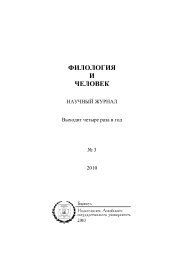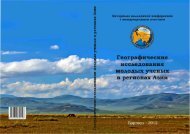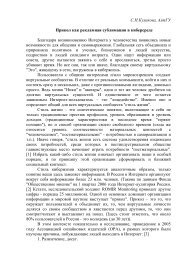Erasmus Mundus Action 1 Compendium 2009 - EACEA - Europa
Erasmus Mundus Action 1 Compendium 2009 - EACEA - Europa
Erasmus Mundus Action 1 Compendium 2009 - EACEA - Europa
Create successful ePaper yourself
Turn your PDF publications into a flip-book with our unique Google optimized e-Paper software.
<strong>Erasmus</strong> <strong>Mundus</strong> Masters Courses<br />
EMBC<br />
<strong>Erasmus</strong> <strong>Mundus</strong> Master of Science in Marine Biodiversity and Conservation<br />
Duration: 2 years<br />
Course description:<br />
The <strong>Erasmus</strong> <strong>Mundus</strong> master of Science in Marine Biodiversity and Conservation (EMBC) is offered<br />
by a University consortium consisting of six partners: Ghent University (Belgium), University of Bremen<br />
(Germany), University of Pierre et Marie Curie - Paris 6 (France), University of the Algarve (Portugal),<br />
University of Oviedo (Spain) and University of Klaipèda (Lithuania).<br />
The study programme is divided in 3 thematic modules:<br />
(1) Understanding the structure and function of marine biodiversity deals with the fundamental aspects<br />
of Oceanography, the structure and functioning of Marine Biodiversity (from genes to habitats) and<br />
with Impact studies (at least 24 ECTS).<br />
(2) Toolbox for investigating marine biodiversity provides an advanced training in Statistics and<br />
experimental design, Modelling, Taxonomy, Data and Information Management, Field observations<br />
and interpretation and Molecular methods (at least 20 ECTS).<br />
(3) Conservation and Restoration of marine biodiversity deals with the application of the above<br />
mentioned theories and methods in order to develop a sustainable use of the marine environment (at<br />
least 10 ECTS).<br />
The programme (2 years or 120 ECTS) is complemented with summer schools operating within the<br />
EU-Network of Excellence MarBEF. A research project (Master thesis) of 30 ECTS is presented within<br />
the field of one of the three thematic areas. Transferable skills (including training in native languages,<br />
scientific communication, research management) is provided as well. Elective courses count for 20<br />
ECTS.<br />
Student mobility is an integral part of the Master. 50 students (25 third country students and 25<br />
European students) start in one of the three group I Universities (Gent, Bremen or Algarve) for 2<br />
semesters; for the third semester, students move to one of the group II Universities (Paris, Oviedo or<br />
Klaipèda). The research project for the thesis work can be performed in one of the partner institutions.<br />
The language of instruction is English. During the study period, the ‘survival’ languages (Dutch,<br />
German, Portuguese, French, Spanish or Lithuanian) can be studied as well.<br />
The course is open to students with at least a bachelor (or Master) degree in biology, ecology,<br />
environmental sciences, oceanography, marine sciences, geography, geology, or other equivalent<br />
degrees with minimum 180 credits.<br />
Website: http://embc.marbef.org<br />
Partners:<br />
Ghent University, Belgium (Co-ordinating Institution)<br />
University Pierre et Marie Curie - Paris 6, France<br />
University of Oviedo, Spain<br />
Klaipèda University, Lithuania<br />
University of Bremen, Germany<br />
University of the Algarve, Portugal<br />
Contact:<br />
Magda Vincx<br />
Ghent University<br />
Krijgslaan 281, building S8<br />
9000 Gent, BELGIUM<br />
magda.vincx@ugent.be<br />
36






